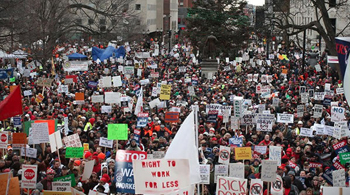- Home
- News
- Features
- Topics
- Labor
- Management
- Opinions/Blogs
- Tools & Resources
ALEC’s Decades Of ‘Right-To-Work’ Effort Pay Off In Michigan
By PAUL ABOWD, Center for Public Integrity—Amid protests by labor unions, and objections from the stateʼs congressional delegation and even the president, Michiganʼs Republican Gov. Rick Snyder signed a “right-to-work” bill into law in December 11, 2012, drawn word-for-word from a 32-year-old “model bill” pushed by a corporate-funded, conservative think tank.
The legislation deals a severe blow to organized labor in a state that has the fifth-highest union density in the country, and it marks the revival of an effort long promoted by the influential American Legislative Exchange Council, a Washington, D.C.-based nonprofit that has seen its share of controversy recently.
Since 1973, ALEC has hosted corporate-sponsored meetings where state legislators and lobbyists meet behind closed doors to write and vote on model legislation.

In a 1992 annual report, the free-market think tank boasted that it “provides the private sector an unparalleled opportunity” to influence state legislation.
One of its first priorities was passage of right-to-work laws, which now exist in 24 states.
The 16 states with the lowest union density in the country have right-to-work laws, mostly in the American South and West, while the 13 states with the highest union density do not, until this week.
Right-To-Work Vs. ʻForced Unionismʼ
In a publication celebrating its 25th year, ALEC said it “began striking out against forced unionism and for the right to work in 1979.” ALEC members endorsed the law as model right-to-work legislation and began introducing it in states in 1980.
Federal law prohibits workplaces from requiring employees to belong to a union and pay dues. However, employees, be they union members or not, may still enjoy the benefits of a union-negotiated contract.
While labor organizations cannot compel workers to join the union, they can require workers at a unionized workplace to pay an “agency fee” to cover the cost of negotiating contracts on a workerʼs behalf.
Unions argue that these fees, which are less than membership dues, prevent “free riders” who would reap the benefits of union representation without chipping in.
Right-to-work laws ban this arrangement, creating “open shops,” where new employees at a workplace that is unionized do not have to join the union, pay dues or pay the lesser agency fee.
List your business in the premium web directory for free This website is listed under Human Resources Directory




